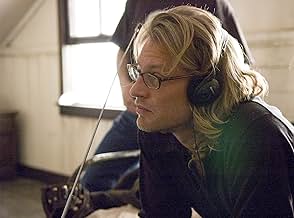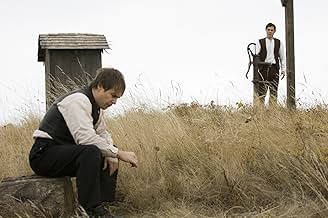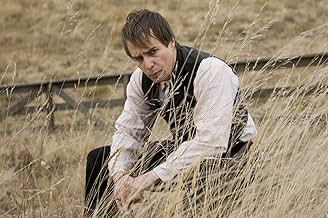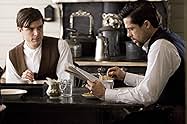L'Assassinat de Jesse James par le lâche Robert Ford
- 2007
- Tous publics
- 2h 40m
Robert Ford, who has idolized Jesse James since childhood, tries hard to join the resurgent gang of the Missouri outlaw, but gradually becomes resentful of the bandit leader.Robert Ford, who has idolized Jesse James since childhood, tries hard to join the resurgent gang of the Missouri outlaw, but gradually becomes resentful of the bandit leader.Robert Ford, who has idolized Jesse James since childhood, tries hard to join the resurgent gang of the Missouri outlaw, but gradually becomes resentful of the bandit leader.
- Nominated for 2 Oscars
- 25 wins & 69 nominations total
- Baggagemaster
- (as James DeFelice)
- Danish Train Passenger
- (as Torben S. Hansen)
- Director
- Writers
- All cast & crew
- Production, box office & more at IMDbPro
Featured reviews
The style of the film is often visually arresting and downright disturbing, especially in the acts of violence, which leave the most gruesome parts slightly off camera, but are frequently shot and framed in such a way as to maximize shock value and leave an uncomfortable feeling of tension in the theater seats. Dominik sometimes relies too heavily on voice-over narration torn straight from the book upon which the film is based leaving us to assume that aside from dreadfully beautiful photography of passing clouds and desolate Midwestern landscapes, he wasn't always sure how he visually wanted to tell the story. This leads to a sometimes snails' pace as the plot unfolds, though the haunting Oscar-worthy cinematography from Roger Deakins and mesmerizing music score from Nick Cave and Warren Ellis eventually get under your skin even as the hands of the clock seem to move slower as if stuck in a pretty photograph of a nightmare.
The acting in the film is superb from all involved. However, the performances often blur the line between caricatured scenery-chewing and emotional nuance (especially from Pitt and Rockwell). While there is some entertainment to be found in the lighter scenes of camaraderie amongst the gang members, the audience never really feels anything for the characters aside from sharing their sense of paranoia and fear knowing that around any corner someone will be betrayed and shot. The film also suffers from some scene stealing cameos from James Carville as the governor hell-bent on catching Jesse and the otherwise lovely Zooey Deschanel, who appears out of nowhere for a few moments about ten minutes after the film should have rightfully ended.
When the credits finally rolled, I wasn't sure what to make of the film. There's some unforgettable imagery (my personal favorite being the almost surreal depiction of the cloth-masked robbers waiting in the dark woods as the train comes roaring down the tracks), and many commendable artistic elements to be found in the film. If the idea was to leave the audience feeling the era showcased was a tension-riddled and violently lonely existence, then the film succeeded wonderfully. Those seeking a more pure entertainment will most assuredly be left stressed and stretched to their limits.
"Jesse James" delves deep into the inner conflicts and emotions of every character. We live with them, eat with them, and often feel their pain or their confusion. This confusion is often associated with the bi-polar nature of the film's central character, Jesse James, played by none other than Brad Pitt. Casey Affleck delivers a subtle performance here that actually becomes the most effective as the film progresses over its 160 minute running time. I hated Robert Ford for a good portion of the film, thought he was so annoying and clingy that it was a wonder Jesse James didn't kill him within the first day of their complex relationship. But then, as I sat through the so called "gruelling" running time of the film, I learned to feel for him and understand his motives and attraction for Jesse. But ultimately, his childhood, comic book worship of the famous outlaw changes.
The "style" of the film is evident in the first frame of passing clouds. Roger Deacon's cinematography is the best I've seen since Conrad Hall's work in Road to Perdition, perhaps better. He is definitely winning the Oscar this year, between this and No Country For Old Men. There is a scene involving a train robbery where the visuals and utter style blew me away. The lighting and camera direction becomes more subtle and less noticeable after the train scene, but, does not lessen in quality and pure artistry. There is a topic on the IMDb message boards approaching the topic of whether certain films should be labeled "art films." Well all films are works of art, some are horrendous, some are extraordinary. Well, The Assassination of Jesse James by the Coward Robert Ford is an extraordinary work of art.
But was that accepted version the real story? For the first time the Ford brothers, Robert and Charley, get their due. As played by Casey Affleck, Robert Ford was a most complex character indeed. Ford is shown for what he was, a moonstruck kid who was brought up on those dime novels and idolized the legendary bandit. The fact that Charley was already riding with the James gang got him into the group.
After the last job the James gang pulled and the only Ford was ever in on, the Fords kind of attached themselves to Jesse James. Of course the idol is no hero. Brad Pitt plays a most unheroic Jesse.
Hints of Pitt's interpretation of Jesse's character are found in the classic portrayal of Jesse James by Tyrone Power. Remember when the laconic Henry Fonda as Frank James dresses Jesse down, tells him he's getting mean, meaner every day even with some of his own gang members? Power was showing signs of it, but we see Pitt as Jesse do some really brutal and cruel things. At the same time he's a loving husband to Mary Louise Parker and doting father to his two children.
As good as Pitt is I think the acting honors go to Casey Affleck. His gradual disillusion with his idol is really something to see on the screen. He becomes really scared of Pitt for reasons I won't reveal, but were definitely sufficient to want him to get Pitt.
We also get to see the Fords sorry aftermath. Things did not go so well for them. Bob Ford did not quite get the acclaim he would have liked as Jesse James became bigger after death than in life.
Frank James as played briefly in the beginning is an odd peripheral character in this film. The James brothers did separate some months before Jesse's death. Frank is played by Sam Shepard who has an encounter with young Bob Ford at the beginning of the film and announces to one and all, the kid creeps him out. But Jesse likes having the kid follow him around like a puppy dog to his ultimate regret.
The Assassination of Jesse James by the Coward Robert Ford is a very good western and we sure don't see too many of them in these times. It's shot in an unusual color, almost like one of those sepia-tone films that were in vogue for a brief spell. The location shooting was done in western Canada and looks a whole lot more like Missouri then than Missouri does now.
Visually, the film soars beyond anything that has hit the screen since Conrad Hall's final masterpiece with Road to Perdition. Roger Deakins, the cinematography genius behind The Shawshank Redemption, Kundun, and all the Cohen brothers" films since The Hudsucker Proxy, surpasses his best work. He pulls out all the stops hereintricately orchestrated changes in focus, richly textured colors, dazzling use of light sources, careful manipulations of time, powerfully significant fade-ins and fade-outs, and shots through rain, snow, and rippled old glassto communicate the story. Deakins' contribution stands out in the railroad train robbery sequence at the beginning of the film. Clearly defined, flickering light sources and deep black shadows create a dazzling, nightmarish vision that haunts the rest of the film. This sequence alone is worth the price of admission.
The richly textured, historically precise visual aspects of the film bring to mind Terrence Malick's Days of Heaven and Robert Altman's McCabe and Mrs. Miller. However, instead of the understated, "realistic" performances featured in those films, The Assassination of Jesse James showcases powerful, yet still realistic performances by an outstanding ensemble cast.
Sam Rockwell, as the not-too-bright but well-meaning Charley Ford, and Mary-Louise Parker, as Jesse's loving wife, stand out. Yet the film belongs to the two titular leads, both of whom deliver the performances of their careers and create characters filled with disturbing contradictions. Brad Pitt's Jesse James is alternately pitiable and terrifyingan affectionate, loving father, an old-before-his-time sage, an adventurous daredevil, an unrepentant bad boy, and a vicious sociopath. Casey Affleck's Robin Ford is a complex, repellent, and tragic character who challenges the audience's complicity in the undercurrents of the film.
All in all, this is a great filmnot for those seeking the simple pleasures of instant gratification. But definitely worth the attention of those who still believe that movies are an art form.
Did you know
- TriviaCinematographer Roger Deakins has called the arrival of the train in darkness as one of the high points of his career.
- GoofsJesse James uses the term "gunslinger" but this term didn't come into use until at least the 1920's. Terms for outlaw gunmen appropriate for the time would have been gunman, pistoleer, shootist, or even gunfighter.
- Quotes
[last lines]
Narrator: He was ashamed of his persiflage, his boasting, his pretensions of courage and ruthlessness; he was sorry about his cold-bloodedness, his dispassion, his inability to express what he now believed was the case- that he truly regretted killing Jesse, that he missed the man as much as anybody and wished his murder hadn't been necessary. Even as he circulated his saloon he knew that the smiles disappeared when he passed by. He received so many menacing letters that he could read them without any reaction except curiosity. He kept to his apartment all day, flipping over playing cards, looking at his destiny in every King and Jack. Edward O'Kelly came up from Bachelor at one P.M. on the 8th. He had no grand scheme. No strategy. No agreement with higher authorities. Nothing but a vague longing for glory, and a generalized wish for revenge against Robert Ford. Edward O'Kelly would be ordered to serve a life sentence in the Colorado Penitentiary for second degree murder. Over seven thousand signatures would eventually be gathered in a petition asking for O'Kelly's release, and in 1902, Governor James B. Ullman would pardon the man. There would be no eulogies for Bob, no photographs of his body would be sold in sundries stores, no people would crowd the streets in the rain to see his funeral cortege, no biographies would be written about him, no children named after him, no one would ever pay twenty-five cents to stand in the rooms he grew up in. The shotgun would ignite, and Ella Mae would scream, but Robert Ford would only lay on the floor and look at the ceiling, the light going out of his eyes before he could find the right words.
- Crazy creditsThe film does not contain either an opening title nor intro credits. The film title is displayed first after the final fadeout.
Details
- Release date
- Countries of origin
- Official sites
- Languages
- Also known as
- El asesinato de Jesse James por el cobarde Robert Ford
- Filming locations
- Production companies
- See more company credits at IMDbPro
Box office
- Budget
- $30,000,000 (estimated)
- Gross US & Canada
- $3,909,149
- Opening weekend US & Canada
- $147,812
- Sep 23, 2007
- Gross worldwide
- $15,004,260
- Runtime2 hours 40 minutes
- Color
- Sound mix
- Aspect ratio
- 2.39 : 1
Contribute to this page






































